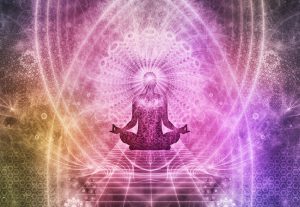Yesterday, I wrote that I asked the question, “What is the purpose of yoga?” I received 174 responses. The two most popular responses were that there is no single purpose to yoga or that the purpose of yoga is whatever you want it to be. I felt astonished at these answers. Do some postures and hopes something beneficial comes of it. That, basically, was the most common response.
Swing a hammer and hope a house gets built out of the swinging.
Do some asana and hope something beneficial comes of it.
Without correct knowledge about the purpose of yoga—or anything—it’s unlikely that a person will experience the benefits of that purpose. It might happen accidentally but that’s a rather crappy way to do anything.
Correct Knowledge
What are sources of correct knowledge? Scripture, including the guru’s word; inference and direct perception. (See Yoga Sutras 1.7 & Guru Tattva 9.290)
Scriptures  are the writings or words of someone else about what they’ve experienced or they are what someone else wrote about what someone else experienced. Scriptures are the least reliable source of correct knowledge. In one sense, my words on this topic are scripture. They’re my words about my experience with this subject. Just as I asked yesterday, please do not believe me.
are the writings or words of someone else about what they’ve experienced or they are what someone else wrote about what someone else experienced. Scriptures are the least reliable source of correct knowledge. In one sense, my words on this topic are scripture. They’re my words about my experience with this subject. Just as I asked yesterday, please do not believe me.
Inference is you taking the time to think about and reason with what you’ve read or heard. If you just believe me or anyone else then you never reach this step.
Direct perception is applying what you’ve inferred. Direct perception is your own direct experience with the subject at hand. Direct perception either validates scripture or it does not. If it doesn’t, then either the scripture is incorrect or the inference is incorrect.
Tomorrow, I’ll tell you what I understand the purpose of yoga to be, that’s scripture. I’ll ask that you apply your own reasoning and thought to what I tell you, that’s inference. Finally, I’ll ask you to directly experience what I understand the purpose of yoga to be, that’s direct perception.
For now, let me write a few words about the responses that I received.
Purposes of Yoga?
Bhoga
Bhoga is material pleasure. If  health, wealth, name or fame are your motivation for doing yoga, that’s bhoga. Bhoga isn’t a terrible thing, it’s very much like using a hammer to build a mansion. Be aware, however, every step of the bhoga path reinforces the very thing that yoga is intended to undo.
health, wealth, name or fame are your motivation for doing yoga, that’s bhoga. Bhoga isn’t a terrible thing, it’s very much like using a hammer to build a mansion. Be aware, however, every step of the bhoga path reinforces the very thing that yoga is intended to undo.
This doesn’t mean that if you experience health, wealth, name or fame as a result of your yoga practice that you were necessarily walking the bhoga path. Those things can be the natural fringe benefit of this practice, they’re not a problem. Bhoga all comes down to why you practice yoga.
Bhoga is an expression of egoism, attachment and/or clinging to bodily life which Patanjali identified as obstacles (Yoga Sutras, 2.3). Bhoga can’t be the purpose of yoga.
Union
Practitioners who have studied some will talk about yoga as union. Before long, the conversation will turn to creating union between heart, mind, body and soul. None of the scriptures ever mention this kind of union. Yoga Journal mentions this kind of union.
who have studied some will talk about yoga as union. Before long, the conversation will turn to creating union between heart, mind, body and soul. None of the scriptures ever mention this kind of union. Yoga Journal mentions this kind of union.
Practitioners with a little more knowledge will talk about using yoga to create union with like-minded people or with humanity in general or with the divine.
Yoga is not about the creation of union. Yoga is union. Union already exists and cannot be created. It could be said that the purpose of yoga is to recognized this already existent Union but that still leaves us with the question why. Why would we want to do that?
If the answer to the question “why” isn’t so obvious that asking why becomes stupid, then we haven’t really understood the purpose yet.
Realizing the Self
For the spiritual seeker, the sadhaka, the one who knows there is more to yoga then touching the toes. For the one who sees more within this practice than a way to sculpt bodies or to promote social justice. For such a one, self-realization is the purpose of yoga. This is enlightenment and this is what “real” yogis seek.
I know this was my primary focus and I was very sure this was the purpose of yoga. If this is the purpose of yoga, it fails to meet two very important qualifications.
Self-realization as a purpose fails to answer the question, “Why?” Why would someone want to be self-realized?
Self-realization being the purpose of yoga also fails the scriptural test.
As Lord Krsna says, “Oh Dhananjaya (Arjuna)! Actions do not bind that self-possessed person who has renounced actions through yoga and has destroyed doubts through (true) knowledge.” (Bhagavad Gita 4.41)
. . . .
In the stanza under discussion, it is said that ‘actions do not bind the self-possessed.’ The question arises, who can be called a self-possessed person? In general it may be said that every human being is ‘self-possessed’, except the one who does not know the answer to the question ‘who am I?’ In this stanza, Lord Krsna has called a self-realized yogi ‘self-possessed’. In fact, the real practice of yoga begins only after self-realization. Maharsi Patanjali says, “As a result of self-realization, all obstacles are removed, faith is enhanced, and worldly enjoyments no longer remain an attraction.” (Yoga Sutras 1.29)
The bhakta yogis as well as the jnana yogi attain self-realization. It is only after crossing this stage that they are not defeated at the hands of various obstacles and their inner journey is not cut short. There are various means for attaining self-realization, but the stage in which entry to the path of self-realization is secured is one and the same for all; that is the stage of pranotthana or the release of prana.
Swami Kripalu, Science of Meditation, Chapter 9, Section 8
(available at www dot naturalmeditation dot net)
In fact, the real practice of yoga begins only after self-realization. If, as Swami Kripalu asserts, the real practice of yoga begins only after self-realization, then self-realization can’t be the purpose of yoga.
Tomorrow, we’ll look at the purpose of yoga.
Jai Bhagwan
